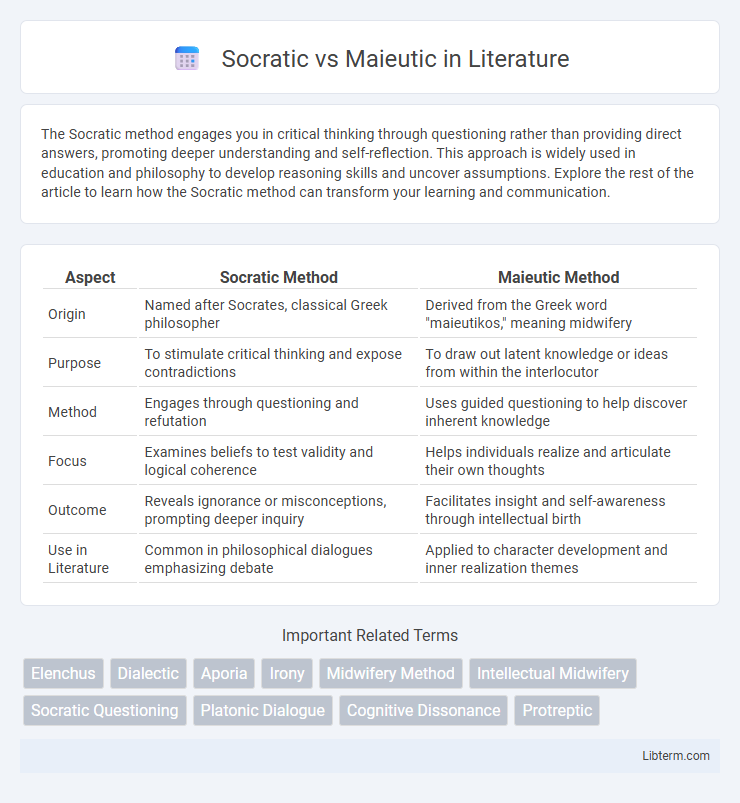The Socratic method engages you in critical thinking through questioning rather than providing direct answers, promoting deeper understanding and self-reflection. This approach is widely used in education and philosophy to develop reasoning skills and uncover assumptions. Explore the rest of the article to learn how the Socratic method can transform your learning and communication.
Table of Comparison
| Aspect | Socratic Method | Maieutic Method |
|---|---|---|
| Origin | Named after Socrates, classical Greek philosopher | Derived from the Greek word "maieutikos," meaning midwifery |
| Purpose | To stimulate critical thinking and expose contradictions | To draw out latent knowledge or ideas from within the interlocutor |
| Method | Engages through questioning and refutation | Uses guided questioning to help discover inherent knowledge |
| Focus | Examines beliefs to test validity and logical coherence | Helps individuals realize and articulate their own thoughts |
| Outcome | Reveals ignorance or misconceptions, prompting deeper inquiry | Facilitates insight and self-awareness through intellectual birth |
| Use in Literature | Common in philosophical dialogues emphasizing debate | Applied to character development and inner realization themes |
Introduction to Socratic and Maieutic Methods
Socratic and Maieutic methods both revolve around dialogue and questioning but serve different purposes in the learning process. The Socratic method uses probing questions to stimulate critical thinking and expose contradictions in one's beliefs, leading to deeper insight. The Maieutic method, rooted in Socrates' philosophy, aims to "give birth" to knowledge by helping individuals uncover truths already present within their minds through guided questioning.
Defining the Socratic Method
The Socratic Method is a form of dialectical questioning aimed at stimulating critical thinking and illuminating ideas through dialogue. It involves asking a series of carefully crafted questions to challenge assumptions and uncover underlying beliefs, promoting deeper understanding. This technique contrasts with the Maieutic approach, which focuses more on drawing out latent knowledge through guided discovery rather than direct interrogation.
Understanding the Maieutic Approach
The Maieutic approach, rooted in Socratic dialogue, emphasizes drawing out knowledge through guided questioning rather than direct instruction. It encourages learners to discover truths by reflecting deeply on their own thoughts and experiences, facilitating self-awareness and critical thinking. This method contrasts with traditional didactic teaching by prioritizing internal realization over external information delivery.
Historical Origins and Philosophical Roots
The Socratic method, originating from Socrates in ancient Athens during the 5th century BCE, employs dialectical questioning to stimulate critical thinking and expose contradictions in one's beliefs. Maieutic, derived from the Greek word for midwifery, reflects Socrates' comparison of his technique to assisting others in "birthing" knowledge from within, deeply rooted in Platonic philosophy emphasizing innate ideas. Both approaches share historical roots in classical Greek philosophy but highlight different aspects of knowledge discovery--Socratic focusing on cross-examination and Maieutic on internal realization.
Key Differences Between Socratic and Maieutic Techniques
Socratic technique centers on asking a series of targeted questions to stimulate critical thinking and expose underlying assumptions, while Maieutic technique emphasizes helping individuals bring forth their innate knowledge through guided dialogue. The key difference lies in Socratic method's focus on external questioning to challenge beliefs, contrasted with Maieutic method's inward focus on self-discovery and intellectual birth. Socratic is often more analytical and confrontational, Maieutic more facilitative and supportive in nature.
Applications in Modern Education
Socratic and maieutic methods both emphasize critical thinking and active dialogue, but in modern education, the Socratic method primarily drives inquiry-based learning through structured questioning that challenges assumptions. Maieutic approaches focus on unlocking students' innate knowledge by facilitating self-discovery and reflective thinking, often integrated into personalized learning and counseling settings. Both techniques enhance metacognitive skills and foster deeper understanding, proving essential in developing problem-solving abilities across disciplines.
Strengths of the Socratic Method
The Socratic Method excels in fostering critical thinking by encouraging continuous questioning that challenges assumptions and promotes deeper understanding. It strengthens analytical skills through dialectical exchanges, enabling learners to uncover contradictions and refine their ideas independently. This method enhances active engagement and conceptual clarity without relying on direct instruction or predefined answers.
Advantages of the Maieutic Process
The Maieutic process enhances critical thinking by actively guiding individuals to uncover their own knowledge, fostering deeper understanding and personal insight. This method encourages self-discovery and intrinsic motivation, leading to more meaningful and lasting learning outcomes. Its emphasis on collaborative dialogue promotes openness and adaptability, improving communication skills and intellectual growth.
Socratic vs Maieutic in Critical Thinking Development
Socratic methods emphasize rigorous questioning to challenge assumptions and expose contradictions, fostering analytical skills crucial for critical thinking development. Maieutic techniques, rooted in Socratic tradition, focus on drawing out latent knowledge through guided dialogue, enhancing self-discovery and deeper understanding. While Socratic questioning promotes external critique, maieutic practices encourage internal reflection, both contributing uniquely to the cultivation of critical thinking abilities.
Choosing the Right Method for Meaningful Dialogue
Choosing the right method for meaningful dialogue depends on the goals of the conversation: the Socratic method emphasizes asking targeted questions to stimulate critical thinking and uncover underlying assumptions, while the Maieutic method, inspired by Socrates' midwifery metaphor, aims to draw out innate knowledge through guided questioning. Socratic questioning is ideal for challenging ideas and promoting rational analysis, whereas Maieutic dialogue fosters self-discovery and personal insight by encouraging interlocutors to articulate and refine their own beliefs. Selecting between the two approaches hinges on whether the priority is analytical rigor or facilitating deeper internal reflection.
Socratic Infographic

 libterm.com
libterm.com